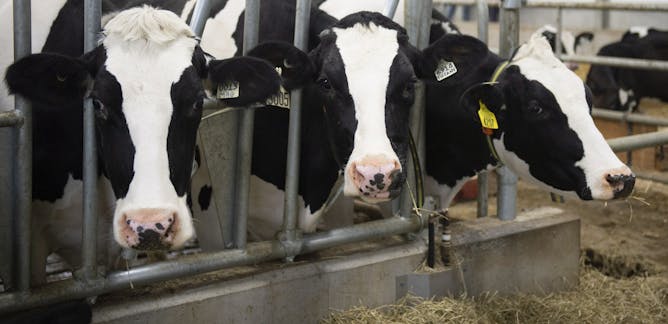
Articles on Zoonoses
Displaying 1 - 20 of 96 articles

Bird flu in U.S. dairy cows has Canadian public health experts on high alert. With one human case identified in Texas, what is the likelihood of H5N1 influenza moving from birds to mammals to people?

Dogs may be a human’s best friend but there are limits – is face licking one of them?

Alaskapox was discovered in 2015 and has generally only caused mild illness – until now.

Vaccination against bird flu offers farmers hope, rather than being caught between the anguish of finding a sick bird and the desolation of having to slaughter their entire flock.

COVID has spread many times from humans to white-tailed deer and back again.

Animals, including the ones that live in our homes, can carry all kinds of illnesses. Most of the time it’s not a problem, but here’s what you should do to avoid getting sick.

From September onwards, migratory birds will arrive on Australian shores. If one is carrying the lethal bird flu, it could devastate our birdlife

Raw seafood dishes such as sushi, poke bowls and ceviche are increasingly popular, but can harbour fish-borne parasites. What’s the best way to protect ourselves?

Avian influenza — commonly known as ‘bird flu’ — is infecting domestic and wild birds in Canada and around the world.

Floods are often followed by waves of diseases because pathogens shed by animals can survive in flood waters for days, raising the risk of infection for humans.

Bats host many viruses dangerous to humans. But it’s only when their habitats are destroyed that we’re at risk.

Authorities have been warned about five virus families that could cause future pandemics. Here are snapshots of the diseases each can cause and why we should be worried.

If surveillance focuses only on diseases that have already emerged, we’ll remain behind the curve. Better prediction of future pandemics will need to integrate animal, planetary and human health.

For the lab leak theory to be true, SARS-CoV-2 must have been present in the Wuhan Institute of Virology before the pandemic started. But there’s not a single piece of data suggesting this.

Data suggests most of the time infection results in either no symptoms or very mild disease for cats and dogs. And the duration of their symptoms, if they get them, may be very short.

This is not the first time that the monkeypox virus has spread beyond Africa, its continent of origin. But the current epidemic is unprecedented for a number of reasons.

Avian influenza virus — or bird flu — can infect domestic poultry such as chickens and turkeys, as well as wild birds. The H5N1 strain has been identified in Canada.

Scientists exploring the possibility of an animal origin for Covid-19 are still investigating the missing link between bats and human beings.

Following the global spread of COVID, there have been widespread calls for blanket bans on the consumption and trade of wild animals. But such bans may have unintended consequences.

The fear that SARS-CoV-2 will evolve in animals and then spread back to us in a more virulent form is unfounded.
